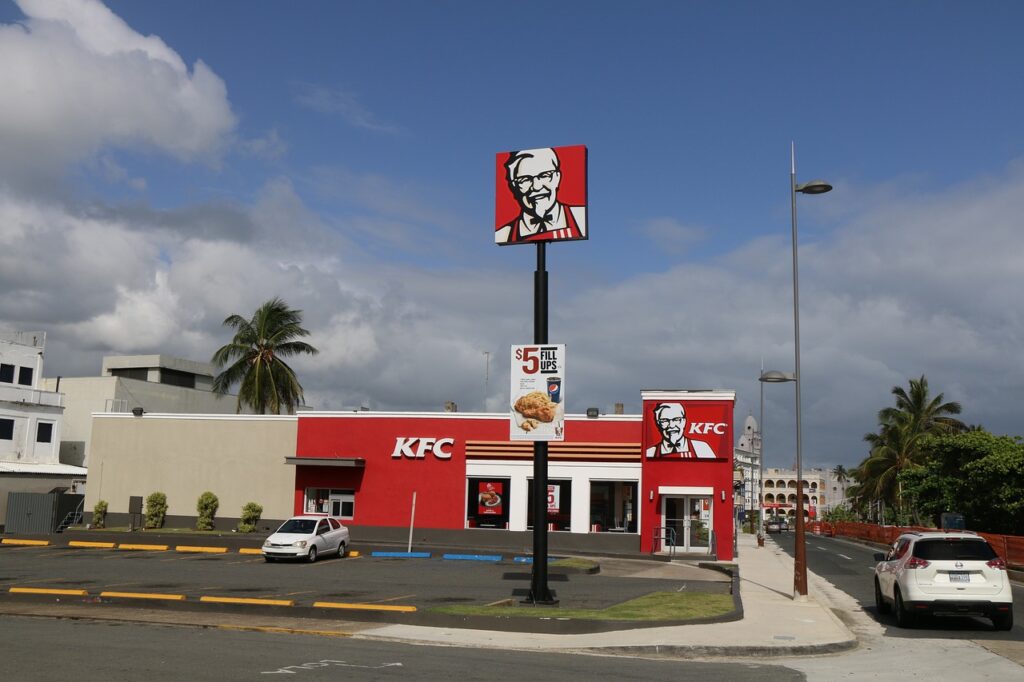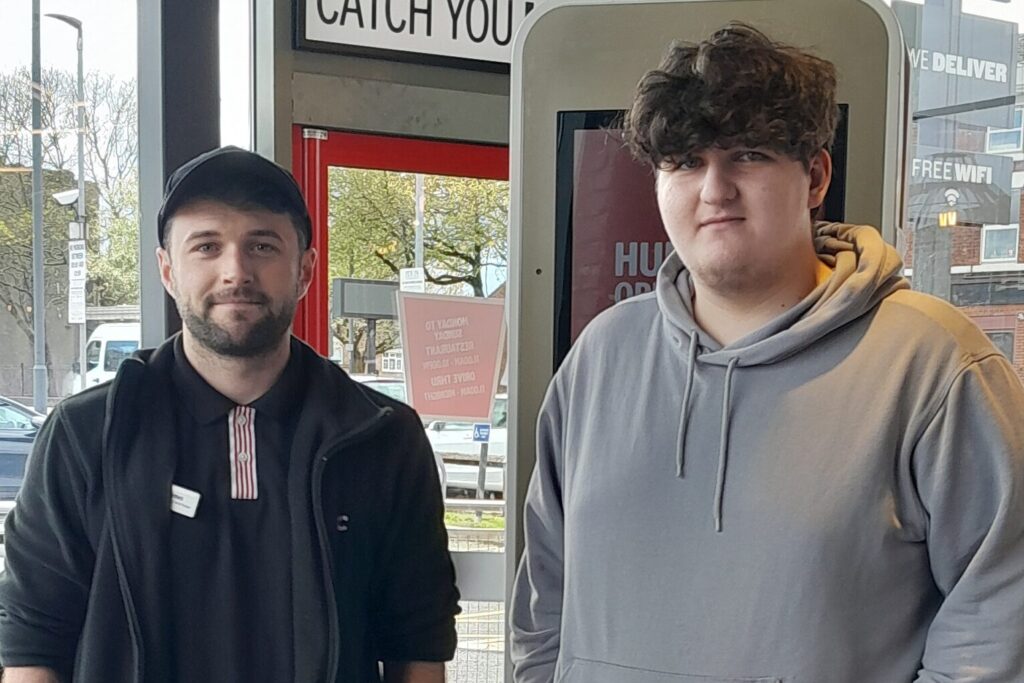- Some 93 per cent of young people have experienced negative treatment in the workplace because of their age, with one in four – 26 per cent – saying the experience made them not want to work again;
- Employers feel young people are overly sensitive (34 per cent), entitled (27 per cent) and lazy (23 per cent), as one in 10 (9 per cent) have rejected a young person for a job due to their age;
- KFC UK&I launches youth board, career mentoring in restaurants, and a review of its hiring processes to make the workforce more inclusive and accessible to young people
Harmful stereotypes and negative treatment of young people in the workforce are fuelling young people to fall out of work, as levels of economic inactivity among young people aged 16-25 hit a record high, new research from UK Youth and KFC UK&I finds.
The study, which sought the views of more than 9,000 young people and 2,000 employers over a three-year period, found that more than nine in 10 (93 per cent) young people have experienced negative treatment in the workplace because of their age, rising from 88% three years ago.
Top issues faced by young people in the workforce include being undervalued (81 per cent) and patronised (78 per cent), while 69 per cent of young people said they have lost out on a promotion and three-quarters (75 per cent) have been outright rejected from a job, on the basis of their age. Meanwhile, almost half (49 per cent) of young people feel like they cannot progress in their career.

The study shows a rise in harmful stereotypes and negative treatment of young people in the workforce at the same time as record levels of youth economic inactivity .
It found that one in 10 (9 per cent) employers have rejected a young person for a job due to their age, while more than a quarter (26 per cent) of young people who have experienced age discrimination in the workplace due to their age said it made them not want to work again.
This trend is reflected in the latest figures from the Office for National Statistics, which show that the number of economically inactive young people, sitting at 872,000, is the highest since records began in the early 1990s.
Damaging stereotypes
Harmful, entrenched stereotypes of young people were found to be at the root of negative treatment of them in the workforce. More than a third of employers described young people as overly sensitive (34 per cent), while more than one in four (27 per cent) said they are entitled and just under a quarter (23 per cent) called young people lazy and work-shy.
The cost of negative stereotypes of young people is not only economic. The study found that more than half (56 per cent) of young people said negative stereotypes have impacted their self-esteem, while 45 per cent said it lowered their self-belief.
Despite perpetuating harmful stereotypes about young people, employers are aware of the toll they can take, with more than a third (38 per cent) saying these stereotypes are unfair and more than half (51 per cent) recognising the impact on young people’s mental health.
Making the workforce more inclusive
The research overwhelmingly found that more needs to be done to help young people into work and make the workplace more inclusive for young people, with three in five (60 per cent) young people saying the current job market is inaccessible to them. A sentiment also echoed by employers, many of which believe young people face challenges in workplace.
The changes young people would most like to see include: making hiring processes more inclusive of young people (27 per cent), listening to young people more (26 per cent) and taking mental health more seriously (26 per cent). Echoing this, nearly two fifths (36 per cent) of employers recognise the language used in their hiring process is not inclusive or accessible for young people.
Positively, 85 per cent of employers recognise they have a responsibility to help young people into the workforce and there is appetite to do more.
In response, KFC has introduced a series of initiatives and commitments, in addition to its youth employability programme Hatch with UK Youth, to make the workforce more inclusive and accessible for young people, including:

- Launching the KFC youth advisory board, created with Youth Beyond Borders, which aims to ensure the voices and views of young people are built into business initiatives, decision-making and hiring practices;
- A review of hiring practices, by the Youth Advisory Board, to ensure they are accessible and inclusive of young people – including analysis of language used and the interview process itself;
- Launching a CV and career mentoring pilot in KFC restaurants;
- Backing the Youth Guarantee, a government initiative to find work for all young people aged 18-21, preventing the exclusion of young people from the world of work.
Lamin Tarawally, Youth Beyond Borders youth lead and KFC youth advisory board chair, said: “Young people today bring immense potential and fresh perspectives, yet age discrimination remains a significant barrier to employment.
“The youth advisory board isn’t just about giving young people a seat at the table; it’s about valuing their unique insights and experiences to drive impactful change within KFC. Through this initiative, we aim to foster a workplace culture that not only welcomes young voices, but actively seeks to learn from them. This is a powerful opportunity to reframe how businesses engage with the next generation, setting a precedent for authentic inclusion.”
We aim to foster a workplace culture that not only welcomes young voices, but actively seeks to learn from them.
Lamin Tarawally, KFC youth advisory board chair
Meghan Farren, KFC UK general manager at KFC, said: “Our research reveals a worrying trend in young people being overlooked and undervalued. How businesses hire, the language they use, and the stereotypes they perpetuate are putting some young people at an unfair disadvantage. And with so many young people facing greater challenges than ever before, it’s turning more away from the workforce for good.
“As one of the largest youth employers in the country, with 65 per cent of our workforce under the age of 25, I see the positive impact young people make to my business every day. It’s why we launched Hatch, and it’s why KFC is committed to making the workforce more accessible and inclusive for young people, starting with the launch of our KFC Youth Advisory Board and reviewing how we hire.
“If the Government and businesses are serious about unlocking growth for the economy, then recognising young people’s potential and helping them get into and stay in work will be critical.”
Ndidi Okezie OBE, UK Youth chief executive officer, said: “This research merely reinforces what we already know – that far too many young people are at risk of long-term unemployment.
“The ongoing effects of the pandemic, the rising cost of living, mental health crises and cuts to the vital support around young people are harming their job prospects, as well as the age discrimination highlighted in this study.
“We must pay attention to the concerns of the next generation as they look to enter the workforce – their success is essential for the economic and overall prosperity of the UK.”

Stephen Hawkins, Hatch graduate and KFC employee, said: “Finding a job felt like an impossible challenge. My lack of work experience and the assumptions employers made about me because of my age created barriers that made it to get an interview and find a job.
“That’s why joining the Hatch programme has been so life-changing for me. I’ve finally found a workplace where I’m supported and valued, and with each day, my confidence continues to grow. Employers should recognise how much Gen Z have to offer and take a chance on young applicants who are ready
to work hard and learn.””
This study follows the roll out of the Hatch programme, UK Youth and KFC’s youth employability programme, launched in Manchester in 2022, which aims to help young people to build their work skills, confidence and land their first job. Since its inception, Hatch has helped more than 700 young people. Last year, 68 per cent of the young people who took part in Hatch were in some form of employment, education or training.
About the research
Opinium Research polled 9,000 young people aged 16-25 in the United Kingdom using an online methodology and a nationally representative sample. Fieldwork was conducted between April 27, 2022, and October 14, 2024.
Opinium Research also polled 2,000 employers (managers and above with hiring and HR responsibility in companies of any size, excluding sole traders) and 1,000 workers above the age of 25 in the United Kingdom using an online methodology. Fieldwork was conducted between April 27, 2022, and October 14, 2024.
About Hatch
Hatch is a social mobility programme created by KFC – in partnership with UK Youth – that aims to help break cycles of inequality, disadvantage and unemployment for young people in the communities KFC serves.
Hatch is a free, eight-week employability programme for young people aged 16-24 who are ready for work but have struggled to access roles because of circumstances beyond their control. Through the programme, KFC hopes to help young people to unlock more opportunities to help reach their potential.
What do young people gain?
- Employability skills using the skills builder framework;
- Guaranteed interview for a role at KFC or another partner;
- Work experience placement at KFC or another partner.
What does it involve?
- Pre-employability workshops over four weeks, including one-to-one training;
- Four weeks of work experience at KFC or another partner;
- Consolidation of learning including a mock interview;
- Real interview guaranteed with KFC upon completion.
About KFC
In 1952, Colonel Harland Sanders opened the first KFC restaurant in Utah. Since then, his Original Recipe chicken and its secret recipe of 11 herbs and spices has become famous all over the world. Today, KFC has more than 900 restaurants across the UK and Ireland.
The Colonel was all about doing things the right way. That means KFC’s chicken is delivered fresh from farm to restaurant in 48 hours. It is prepared carefully by hand in-restaurant by trained cooks, using the very best chicken reared to strict welfare standards. In July 2019, KFC took the next big step in its welfare journey and signed up to the Better Chicken Commitment, a set of six criteria designed to improve the lives of all chickens within the KFC supply chain by 2026.

The right way also means serving fresh, proper food, packed with flavour. So, KFC has worked hard to make nutritional improvements across its menu, so KFC fans have as much choice as possible. KFC has committed to removing 20 per cent of calories per serving by 2025.
The Colonel also believed in feeding promise, wherever it is found, which is why KFC invests heavily in the development and careers of its 27,000 employees. KFC was the first restaurant to launch an honours degree. And since its 2015 launch, the KFC Foundation has paid out grants totalling £5 million to KFC’s
charity partners who are passionate about developing and nurturing young people across the country.
To find out more about us visit kfc.co.uk, or follow the Colonel on X @KFC_UKI and Instagram @kfc_uki.
About UK Youth
UK Youth is a leading charity with a vision that all young people are equipped to thrive and empowered to contribute at every stage of their lives. With an open network of more than 9,000 youth organisations and nation partners; UK Youth reaches more than four million young people across the UK and is focused on unlocking youth work as the catalyst of change that is needed now more than ever. To find out more, visit ukyouth.org
Ryan’s story

A teenager has hailed the impact of the Hatch youth employability programme in his search for work.
Ryan Sinnott, a participant of the Hatch programme in Liverpool, where the scheme is delivered by the Merseyside Youth Association, said: “I’ve faced so many challenges in my hunt for a job. There’s a lack of opportunity for young people across the board, and if you don’t have a certain set of qualifications, you’re even less likely to get employed. I’ve had setbacks along the way and the cost-of-living crisis has only made things worse.”
To read more, click here
The post Harmful stereotypes of young people fuelling record numbers to fall out of work appeared first on UK Youth.


